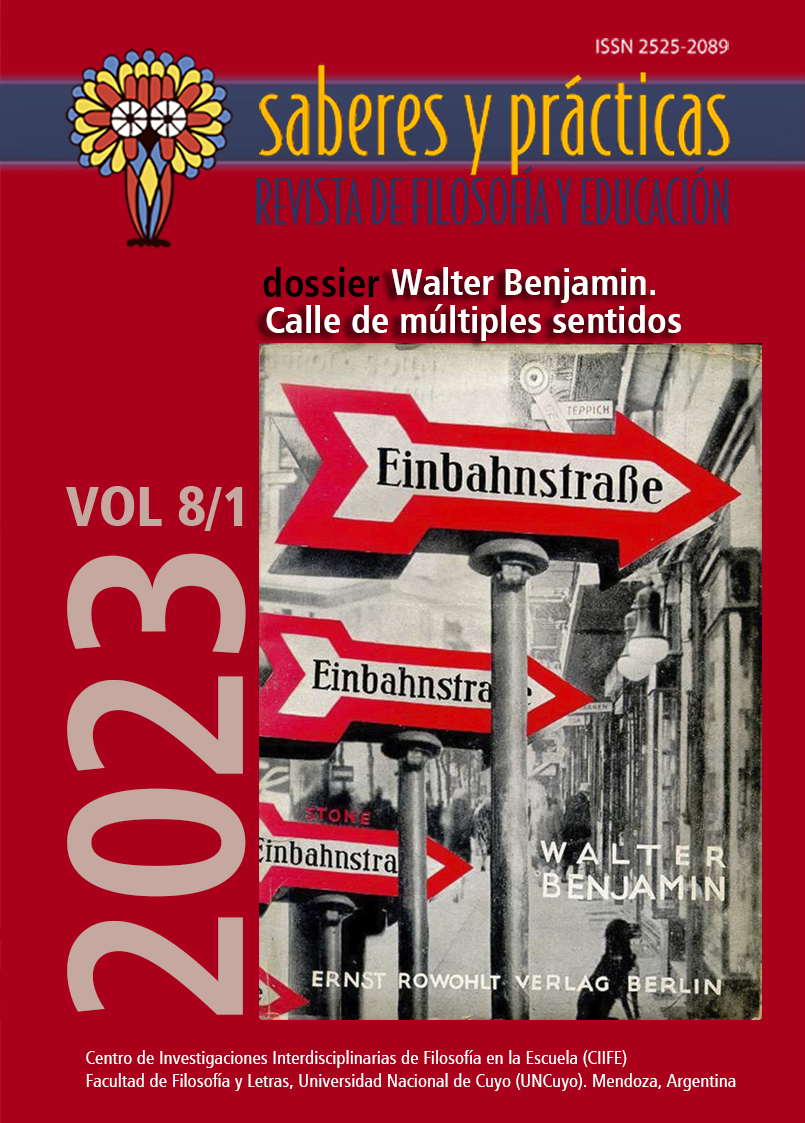Violencia y Poder. La otra inserción a la enseñanza del profesorado novel de Educación Primaria
DOI:
https://doi.org/10.48162/rev.36.087Palavras-chave:
violencia, poder, profesor novel, inserción, primariaResumo
El presente trabajo, expone los resultados de una investigación sobre la apropiación y desarrollo de saberes docentes del profesorado novel durante sus primeras experiencias de ejercicio profesional en el estado de Sinaloa (México). Las evidencias, permitieron advertir un ambiente alterno de inserción que aportaba saberes constreñidos por un contexto delincuencial endémico de comunidades afectadas por el narcotráfico. De ahí que el posicionamiento teórico atendió las relaciones sociales de violencia y poder ante su valor epistémico re-significante del efecto choque con la realidad, propio de esta etapa donde se experimenta una incipiente socialización profesional. La metodología fue de naturaleza cualitativa con sustento en la etnosociología y la entrevista de tipo relato de vida, recuperando las vivencias de 70 profesores nóveles elegidos mediante una muestra no probabilística, caso típico-ideal. Los resultados se agruparon, según sus recurrencias, en cuatro dimensiones jerárquicas: 1) personal, 2) escolar, 3) comunitaria y 4) delincuencial, acorde con su nivel de afectación. Entre las conclusiones, se advierte que la inserción del profesor novel inmersa en un ambiente dominado por la subcultura del narcotráfico, transfigura el aprendizaje de la profesión con saberes docentes específicos y utilizables para sobrevivir esta contingencia dada su influencia intra e inter-áulica.
Downloads
Referências
Álvarez-Gayou, J. L. (2003). Cómo hacer investigación educativa. Paidós Educador.
Arendt, H. (1993). La Condición Humana. Paidós.
Beaud, S. (1996). L´usage de I ´entretien en sciences sociales. Plaidoyer pour « I ´entretien ethnographique », Politix, (35).
Bertaux, D. (2005). Los relatos de vida. Perspectiva etnosociológica. Ediciones Bellaterra.
Bisquerra, R. (2004). Metodología de la investigación educativa. La Muralla.
Feiman-Nemser, S. (2001). For preparation to practice: designing a continuum to strengthen and sustain teaching. Teachers college record, 103, (6), 1013-1055.
Foucault, M. (1998). La Palabras y las Cosas. Una arqueología de las Ciencias Humanas. Editorial Siglo XXI.
Foucault, M. (2002). La Arqueología del Saber. Editorial Siglo XXI.
Foucault, M. (2014). Las redes del poder. Prometeo.
Geertz, C. (1973). La interpretación de las culturas. Gedisa.
Hernández, R., Fernández, C. & Baptista, P. (2014). Metodología de la investigación (6ª ed.). McGraw Hill.
Instituto Nacional de Estadística, Geografía e Informática (2022). Maestros y escuelas por entidades federativa según nivel educativo, ciclos escolares seleccionados 2020/2021. https://www.inegi.org.mx/app/tabulados/interactivos/?px=Educacion_07&bd=Educacion
Marcelo, C. (1991). Aprender a enseñar. Un estudio sobre el proceso de socialización de profesores principiantes. CIDE.
Marcelo, C. (2008). El Profesorado Principiante. Inserción a la docencia. Octaedro.
Rockwell, E. & Mercado, R. (1986). La práctica docente y la formación de maestros. En E. Rockwell y R. Mercado (Eds.), La escuela, lugar del trabajo docente. México: Departamento de Investigaciones Educativas del Centro de Investigación y Estudios Avanzados del IPN.
Rodríguez, G; Gil, J., García, E. (1996). Metodología de la investigación educativa. Aljibe.
Tardif, M. (2004). Los saberes del docente y su desarrollo Profesional. Narcea.
Tulving, E. (1983). Elements of episodic memory. Oxford: Clarendom Press.
Veenman, S. (1984). Perceived Problems of the Beginning Teachers. Review of Education Research. 54, (2), 143-178.
Villoro, L. (1982). Creer, Saber, Conocer. Editorial Siglo XXI.
Publicado
Como Citar
Edição
Seção
Licença
Copyright (c) 2023 Erick Zorobabel Vargas Castro
Este obra está licenciado com uma Licença Creative Commons Atribuição-NãoComercial-CompartilhaIgual 2.5 Argentina.


































